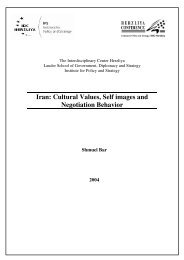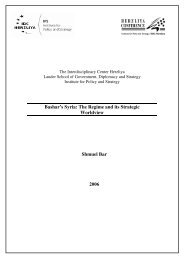nisba (origin title) <strong>Sistani</strong>. His grandfather, Sayyid ‘Ali, who becamea famous scholar 4 moved to Mashhad. It seems that his carreerinfluenced the grandson: the most important centers <strong>of</strong> his studieswere al-Najaf, Samurra’ (Iraq), Mashhad and Qumm (Iran). <strong>The</strong>grandson started his studies in Mashhad and Qumm, but in al-Najafhe spent ten years under the guidance <strong>of</strong> Àyatullah al-‘UÛma al-SayyidAbÙ al-Qasim al-KhÙ’i (died 1992) who was his real mentor, and Íusainal-Íilli. Al-KhÙ’i accorded him the title <strong>of</strong> Mujtahid. This title grants<strong>Sistani</strong> the right to teach and to pass his own judgments on religiousmatters. It seems that al-KhÙ’i was the teacher who influenced <strong>Sistani</strong>more than any other one. <strong>The</strong>refore, It is important to know al-KhÙ’i’sattitude towards the activism <strong>of</strong> the fuqaha’ in political affairs.<strong>The</strong> second half <strong>of</strong> the twentieth century was a period <strong>of</strong> religiouspoliticalagitation inside the Shi‘i establishment in Iraq. Al-KhÙ’i was oneamong the leaders <strong>of</strong> the quietist ‘ulama’ <strong>of</strong> the Îawza (Shi‘i religiousseminary) <strong>of</strong> Najaf. <strong>The</strong> struggles inside the Shi‘i establishment in Iraqin that period are clearly detailed by Y. Nakash in his book <strong>The</strong> Shi‘a inthe Modern Arab World –Reaching for Power (pp. 94-98).Sayyid MuÎammad al-Ñadr, a well known Shi‘ite Iraqi leader, reportedthat <strong>Sistani</strong> told him: “ma ana illa ka-aÎadikum, wa-la Ùjibu ‘alaykumittiba‘i, wa-laysa min Îaqqi dhalika, wa-ana ataÎarraku min bab al-Îisba wa-’l-kifaya” 5 (I am no better than any other one <strong>of</strong> you, I can’timpose on you to imitate me, I have no right to do so, I am acting inconformity to [the duties <strong>of</strong> the cleric who is in charge <strong>of</strong> administratinghis community for God’s sake] and must perform these communityduties [which could be left aside by others if some one personperformed them satisfactorily]. This declaration is very important andcould open the way to a better understanding <strong>of</strong> <strong>Sistani</strong>’s behavior: herefers here to al-Wilaya al-Îisbiyya, a legal Shi‘i theory which rose as areply to Khomeiny’s theory <strong>of</strong> wilayat al-faqih, adopted and applied inthe Islamic Republic <strong>of</strong> Iran.At this point it is important to explain the principles <strong>of</strong> this doctrineand its origins, and to examine to what extent it is practiced by <strong>Sistani</strong>.Since <strong>Sistani</strong> did not write much or express his views publicly on criticalissues that constitute a bone <strong>of</strong> contention between the school <strong>of</strong>Khomeini and his disciples, which adheres to Wilayat al-faqih, and theremaining Shiite scholars who still believe in the principal <strong>of</strong> traditionalreligious authority in Shiism, which rejects this theory, and <strong>of</strong> which<strong>Sistani</strong> is considered it’s most renowned representative, it would beappropriate to examine the positions <strong>of</strong> the person who the biggestinfluence on him, Al-Khui. Furthermore, as far as I know, Al-Khuidedicated the most detailed and clear discussions to this issue.Al-Khui began his teaching career at the Iawza <strong>of</strong> Najaf, the Najaf Shi’icenter for theological studies, in the year 1377/1957, and continuedteaching there till his death in 1992. He was considered to be one<strong>of</strong> the central pillars <strong>of</strong> that Iawza. Al-Khui’s works started to bepublished after his death by Mu’assasat iÎya’ athar al-imam al-KhÙ’i,and they are actually a rewriting <strong>of</strong> his lectures which was done by hisstudents or his son MuÎammad Taqi al-KhÙ’i who was murdered at thebeginning <strong>of</strong> the American invasion <strong>of</strong> Iraq. Among the 34 volumes <strong>of</strong>his work, which deal mostly with fiqh, Ayyatollah al-KhÙ’i dealt withthe subject <strong>of</strong> marja‘iyya (the right to guide the believers in the path<strong>of</strong> Allah and his prophet, Muhammad), as well as with the subject4 Àghā Bozorgh Tahrānī, A‘lām al-Shī‘a, vol. 4, 1423.5 Raed Qāsem,"Shu‘Ùb wilāyat al-faqīh, in www.metransparent.com<strong>of</strong> wilaya in general and the subject <strong>of</strong> wilayat al-faqih in particular.Following is a summary <strong>of</strong> his words, as they appear in a publicationcalled Muqaddimat MawsÙ‘at al-Imam al-KhÙ’i , edited by his pupilSayyid MurtaÃa al-Íakami.<strong>The</strong> Marja‘iyya<strong>The</strong> Marja‘iyya in Islam began with the believers turning to the Prophet(raja‘Ù, they had recourse to the Prophet and the Imams, on everysubject that was determined by Allah and required interpretation.<strong>The</strong> recourse to the Imams was done because they were the heirs andsubstitutes for the Apostle <strong>of</strong> Allah (li-khilafatihim ‘an al-RasÙl), andowing to the knowledge, the jurisprudence and Authority/governance(‘ilm wa-qaÃa’ wa-Îukm) that Allah granted them with. Afterwards theMarja‘iyya was passed on personally (al-niyaba al-khaÒÒa) to the foursubstitutes (al-nuwwab al-arba‘a) during the twelfth Imam’s ‘lesseroccultation’ (al-ghayba al-Òughra). At the last stage, it was passedon to the most accomplished among the fuqaha which were provenworthy <strong>of</strong> being ‘general substitutes’ (niyaba ‘amma ) During theperiod <strong>of</strong> the ‘greater occultation’ (‘aÒr al-ghayba al-kubra).Al-KhÙ’i summarizes this subject by saying: Islam began with divineinspiration and transmission to men (wahi wa-balagh), and ends withruling and imitation (fatwa wa-taqlid).Al-KhÙ’i thinks that power in Islam is based first and foremost, on theQuran and on the ‘itra (=the Imams and the Prophet’s descendants),and that it is supported by the imama and the niyaba ‘amma. <strong>The</strong>niyaba ‘amma originates from the hidden Imam and that is whatgave the substitutes, the nuwwab, the comprehensive responsibility(wilaya ‘amma) and created the existing Marja‘iyya. <strong>The</strong> following is adiscussion <strong>of</strong> each <strong>of</strong> these important subjects:<strong>The</strong> meaning <strong>of</strong> al-niyaba al- ‘ammaWith the end <strong>of</strong> the al-niyaba al-khaÒÒa, the Imam Al-Mahdicontinues to guide the Muslims throughout the generations. He doesnot leave them without a Sheppard who will take care <strong>of</strong> them, withouta certified counselor (Îujja) to lead them, which is the Imam that will“illuminate them with his light and benefit them with his wilaya evenduring his occultation, just as the sun benefits people even when itis covered by clouds” (tafsir al-burhan, 1, 381). <strong>The</strong> Imam left thetransmitters <strong>of</strong> traditions (ruwat al-ahdath) as substitutes (nuwwab)for specific functions, such as reporting the events <strong>of</strong> the Imams’ lives,in order to serve as pro<strong>of</strong> that the stories were transmitted. This can bededucted from the following traditions which are related to the hiddenImam:• “As to the events that occur, turn regarding them to thetransmitters <strong>of</strong> our tradition, for they are my pro<strong>of</strong> toyou that [I transmitted what was entrusted with me]and I am the pro<strong>of</strong> for Allah [that I transmitted thestories to them]” (Wasail al-Shia, 18, ch. 11). Al-KhÙ’iadds that the meaning is transmitters which are worthy<strong>of</strong> being pr<strong>of</strong>f (hujja). He concludes the following fromthese traditions:• <strong>The</strong> nuwwab were granted niyaba ‘ammawithout being original or independent (mindÙn aÒala aw istiqlal).• <strong>The</strong>y received the niyaba to convey the<strong>The</strong> Eleventh Annual Herzliya Conference2
Imams’ traditions in order to use them tosolve people’s problems and conduct theflow <strong>of</strong> life, on condition <strong>of</strong> being able toreach God’s will through ijtihad and fatwa.• <strong>The</strong> niyaba which gave them wilaya(custodianship) over men was not absoluteto the extent that they would be exemptfrom requiring the hidden Imam to be pro<strong>of</strong>for them or to be satisfied with them.• This wilaya did not remove the masum’s(the infallible Imam’s) absolute wilaya. Thiswould demand passing on the infallibilityfrom him to them, as well as passing onhis knowledge <strong>of</strong> hidden matters, and theimpossibility <strong>of</strong> imitating him (i’jaz), and allthe other extraordinary qualities (khasais)which gave him the wilaya as it is.However, this does not prevent passing on thiswilaya due to the general substitution(al-niyaba al-’amma) at the level <strong>of</strong> theleadership, in the boundaries <strong>of</strong> theresponsibility for governance or jurisdiction(masuliyat al-hukm). <strong>The</strong> transmitters <strong>of</strong>traditions do not possess the right to passon this wilaya to others, even if it is a matterwhich is determined (mawdi’), and not bydivine law (hukm). This is due to the factthat they were personally ordered to discussall matters. <strong>The</strong>refore, the meaning <strong>of</strong> thislimited substitution is mujtahidin who makedecisions about laws and hand out fatawa,just as when one says faqih one means thebiggest expert on religious matters (al-afqahfi al-din), who understands best the needs <strong>of</strong>the umma, so that people can turn to himand not to somebody else.• “<strong>The</strong> flowing matters <strong>of</strong> life and the judicial rulings aregiven to those who have knowledge <strong>of</strong> the rules <strong>of</strong>[Allah]” (al-ulama’ bi-’llah), who are trained in Allah’srights and wrongs” (Mustadrak al-wasa’il, 3, 188; Tulafal-’ukul, 238). This tradition says that the fuqaha aregiven the responsibility for judgment, including dealingwith fatawa and general matters concerning theMuslims’ life and survival.• “He among the fuqaha who guards his soul andpractices his religion, who resists his desires andobeys his lord, the simple people must imitate him”(Wasail al-Shia, 18,94). Here, Al-Khui emphasizesthat even if the chain <strong>of</strong> reporters <strong>of</strong> this tradition iscriticized, reason determines that whoever wants torule as a substitute must embody the qualities andthe conditions that were mentioned above; just as theImam’s absence determines that he must have public/general substitutes in the same manner that he hadprivate substitutes, and these general substitutes arechosen according to their talents and not decided bytheir names.•• <strong>The</strong> absolute Wilaya• Some fuqaha tend to equalize between wilayat al-Ma’sum – whether a prophet or an Imam – and wilayatal-faqih, the religious scholar who has authority overthe Muslims, without discerning between them orshowing the differences between them: <strong>The</strong> first isat the level <strong>of</strong> prophecy or Imama, and the second isat the level <strong>of</strong> substitution, the niyaba <strong>of</strong> the ma’sumImam.Whatever wilaya either side receives, one will always bepro<strong>of</strong> <strong>of</strong> the other (ihdahuma hujja ‘ala al-ukhra):prophecy cannot be raised to the level <strong>of</strong> divinity,Imama cannot be raised to the level <strong>of</strong> prophecy, andall the more so faqaha cannot be raised to either levels<strong>of</strong> wilaya that were mentioned earlier. Even if the‘ulama conduct matters, and even if the masses have aright to appoint them to this divine function, the wilayawhich is based on ‘Isma, knowledge <strong>of</strong> esoteric things,and the ability to perform miracles which others can’tperform, is never similar to the wilaya which is based onintegrity and is justified by means <strong>of</strong> the niyaba ‘ammawhich was given to the prophecy and to the Imama,and this is because the special terms which were givento the prophets and Imams and made them worthy <strong>of</strong>the unique wilaya which was given to them.<strong>The</strong> common denominator <strong>of</strong> what passes from the prophet’swilaya on to the Imam is the imama which exists inthe prophet and in the Imam; but, in regards to whatpasses on to the faqih, the common denominator is notthe imama but the niyaba ‘amma and the leadership<strong>of</strong> the Muslims regarding current affairs and solvingproblems. Allah entrusted the prophecy and the Imamawith the wilaya takwiniya, the establishing wilyaya, butthe faqih does not possess wilaya takwiniya nor doeshe possess legislative wilaya. All he has is the fatwa,jurisdiction and leadership according to the measure <strong>of</strong>his suitability to the role <strong>of</strong> substitution in leading theumma. Al-Khui sees in the verse “O believers, obey God,and obey the Messenger and those in authority amongyou” (Qur’an, Women, 59) the origin <strong>of</strong> all kinds <strong>of</strong>wilaya: Wilayat Allah: total obedience and submissionto Allah Wilayat al-Nabi: this includes, among otherthings, the believer’s willingness to sacrifice himself andhis family, and to sacrifice his property. This is based onthe verse: “<strong>The</strong> Prophet is nearer to the believers thantheir selves” (<strong>The</strong> Confederates, 6) Wilayat al-Imam:“Those in authority among you”Wilayat al-faqih: by permission <strong>of</strong> the Hidden Imam whoappointed them as deputies (nuwwab). <strong>The</strong> faqihcan be right or wrong in his judgments. He can beforgiven for that. But the Prophet and the Imam arethemselves the undisputed divine text. Expanding thefaqih’s dominion will not bring him to the stature <strong>of</strong> theprophet and the Imams in matters <strong>of</strong> governance andlegislation.One can see from the discussions that were brought above,how al-Khui navigated his students, and through themthe masses who recognize him as a marja’ taklidand even beyond that, to reject the theory that was<strong>The</strong> Eleventh Annual Herzliya Conference3
















